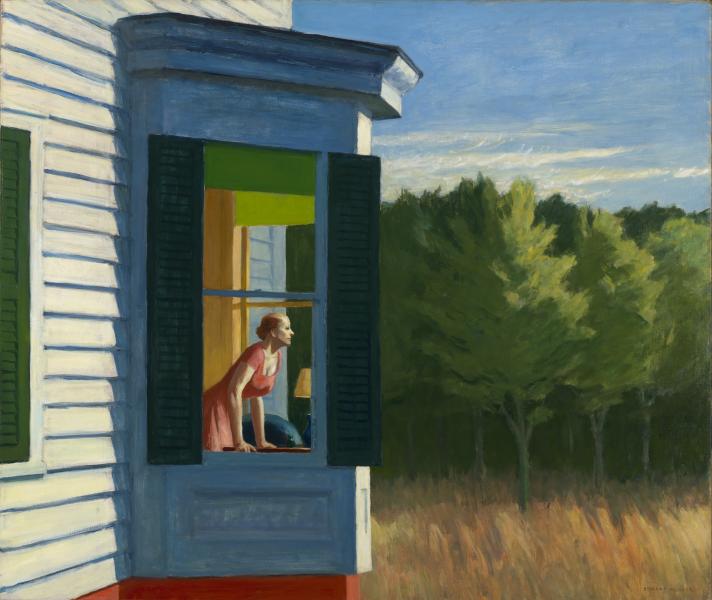Art Hagiographers
by G. Tod Slone (February 2023)

Cape Cod Morning, Edward Hopper, 1950
Reason is my scalpel. And so I dissect this week’s hagiography*. In the art world, iconic artists are presented as gods of perfection. Absence of criticism with their regard is the norm. Each week, “This Week’s Muse” is sent to me via email. Each week, no surprise! Hagiography after hagiography, week after week. Three quotes by this week’s featured artist** were chosen by the Hagiographer-in-Chief, one might expect, to help inflate the artist in question. The quotes were each quite vague, perhaps unsurprising, for clarity, as one might expect, is not supposed to be the m.o. of an esteemed artiste.
“The only quality that endures in art is a personal vision of the world. Methods are transient: personality is enduring.”
So, what to say? What to think? How to interpret the significance of that esoteric statement? Dare one question and challenge it? In today’s world, as in yesterday’s, the reality is not “personal,” but rather ideological. Present a non-conformist vision, for example, in today’s art world of diversity, inclusion, and equity, and it simply might be canceled into non-existence. So, perhaps the only quality that really endures in art is a conformist vision, not a “personal vision,” of the world. Think of Hitler’s state-disapproved “entartete Kunst” (depraved art) and Stalin’s state-approved “Socialist Realism” art. Today, in America, we have the art-establishment-sanctioned art. “Methods are transient,” states the artist. Well, sure, though it rather seems today that “methods” (i.e., forme, as opposed to fond), are really all that count. As for “personality is enduring,” how to interpret that?
“Great art is the outward expression of an inner life in the artist, and this inner life will result in his personal vision of the world.”
And so what might constitute mediocre art? How might it not be the “outward expression of an inner life”? Or is it somehow only the outward expression of an outer life? Hmm. Vague generalities depend on the absence of clarity. How might that absence elevate an artist? What might the difference be between inner and outer lives? Would not the outer life also result in the artist’s personal vision? And how might it affect his/her inner life? Hmm.
“In general, it can be said that a nation’s art is greatest when it most reflects the character of its people.”
That statement is as general (meaningless) as it gets. After all, who decides what can be said and what cannot be said? And how to argue that an entire people possess the same character?
Now, surely the artist in question must have written or said more meaningful statements. And so I googled and obtained a few more of his statements: “I guess I’m not very human. All I really want to do is paint light on the side of a house.” Or how about, “The only real influence I’ve ever had was myself.” Yet, again, the reality is different: we’re all influenced by others, including establishment-anointed artistes. Anyhow, perhaps my “inner life” has been affected by my outer life’s reading of vacuous statements to the point where this essay is in itself a statement of vacuity. “Go figure!” had said my dear ole ma…
*“Hagiographers” were those who wrote about (praised!) the saints. And since well-known artists are generally treated as saints today, modern hagiographers write (praise!) them.
** The artist in question is Edward Hopper. Of course, I am not criticizing his paintings at all, nor am I really criticizing him. The quotes were selected by Molly Demeulenaere, the director of the “All the Arts for All of Us” (though not your arts and not for you) Cultural Center of Cape Cod and writer of “This Week’s Muse.” Read the dialogue de sourds I had with her, Nasty: Notes from a Protest and an Encounter with the Executive Director of the Cultural Center of Cape Cod.
Table of Contents
G. Tod Slone, PhD, lives on Cape Cod, where he was permanently banned in 2012 without warning or due process from Sturgis Library, one of the very oldest in the country. His civil rights are being denied today because he is not permitted to attend any cultural or political events held at his neighborhood library. The only stated reason for the banning was “for the safety of the staff and public.” He has no criminal record at all and has never made a threat. His real crime was that he challenged, in writing, the library’s “collection development” mission that stated “libraries should provide materials and information presenting all points of view.” His point of view was somehow not part of “all points of view.” He is a dissident poet/writer/cartoonist and editor of The American Dissident.
Follow NER on Twitter @NERIconoclast